African Influence in International Organizations
VerifiedAdded on 2020/12/18
|11
|3737
|120
Essay
AI Summary
This essay analyzes the reasons why African states have limited influence in international organizations. It explores historical factors, economic disparities, and the power dynamics within global governance structures, highlighting the challenges African nations face in asserting their interests and shaping international agendas.
Contribute Materials
Your contribution can guide someone’s learning journey. Share your
documents today.
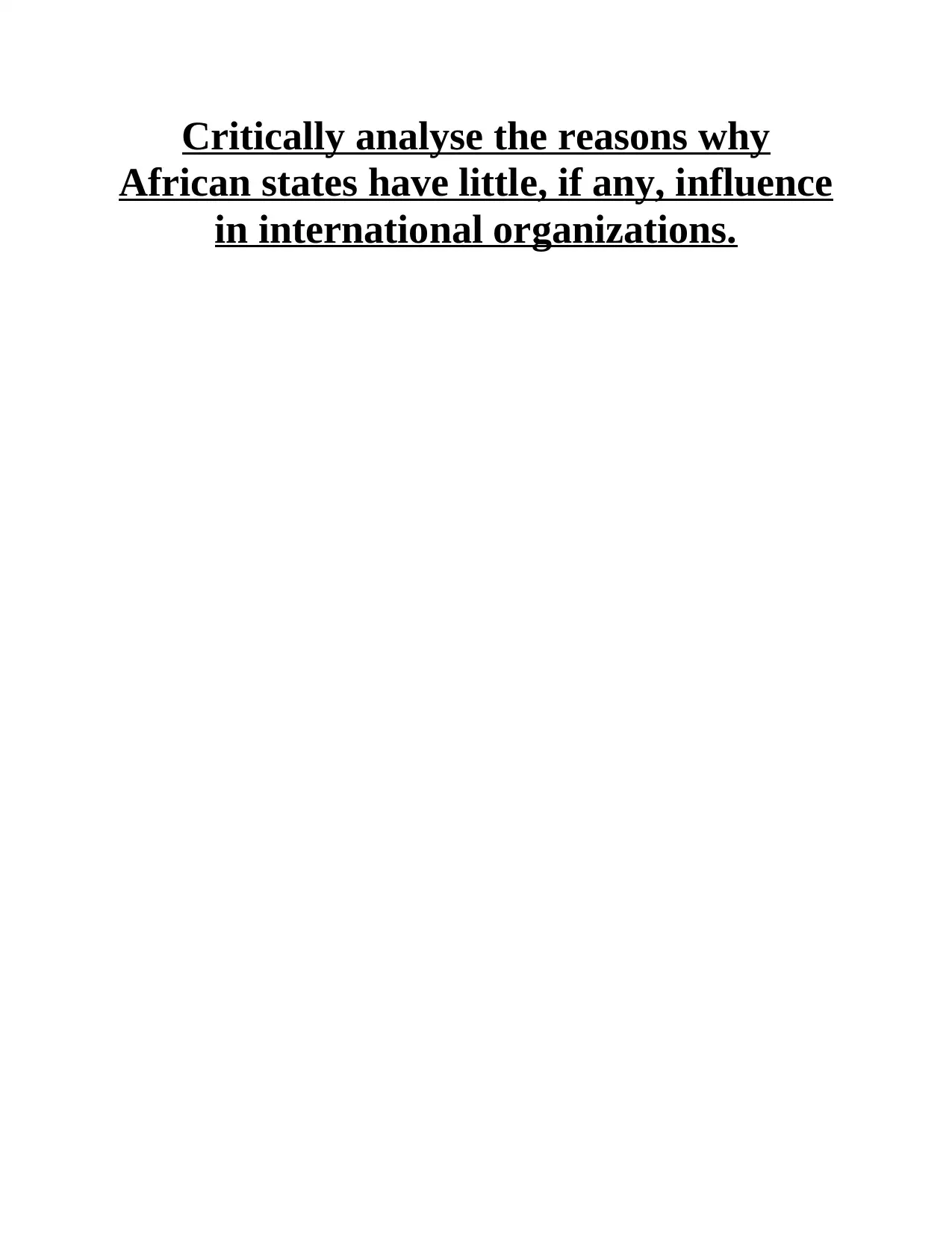
Critically analyse the reasons why
African states have little, if any, influence
in international organizations.
African states have little, if any, influence
in international organizations.
Secure Best Marks with AI Grader
Need help grading? Try our AI Grader for instant feedback on your assignments.
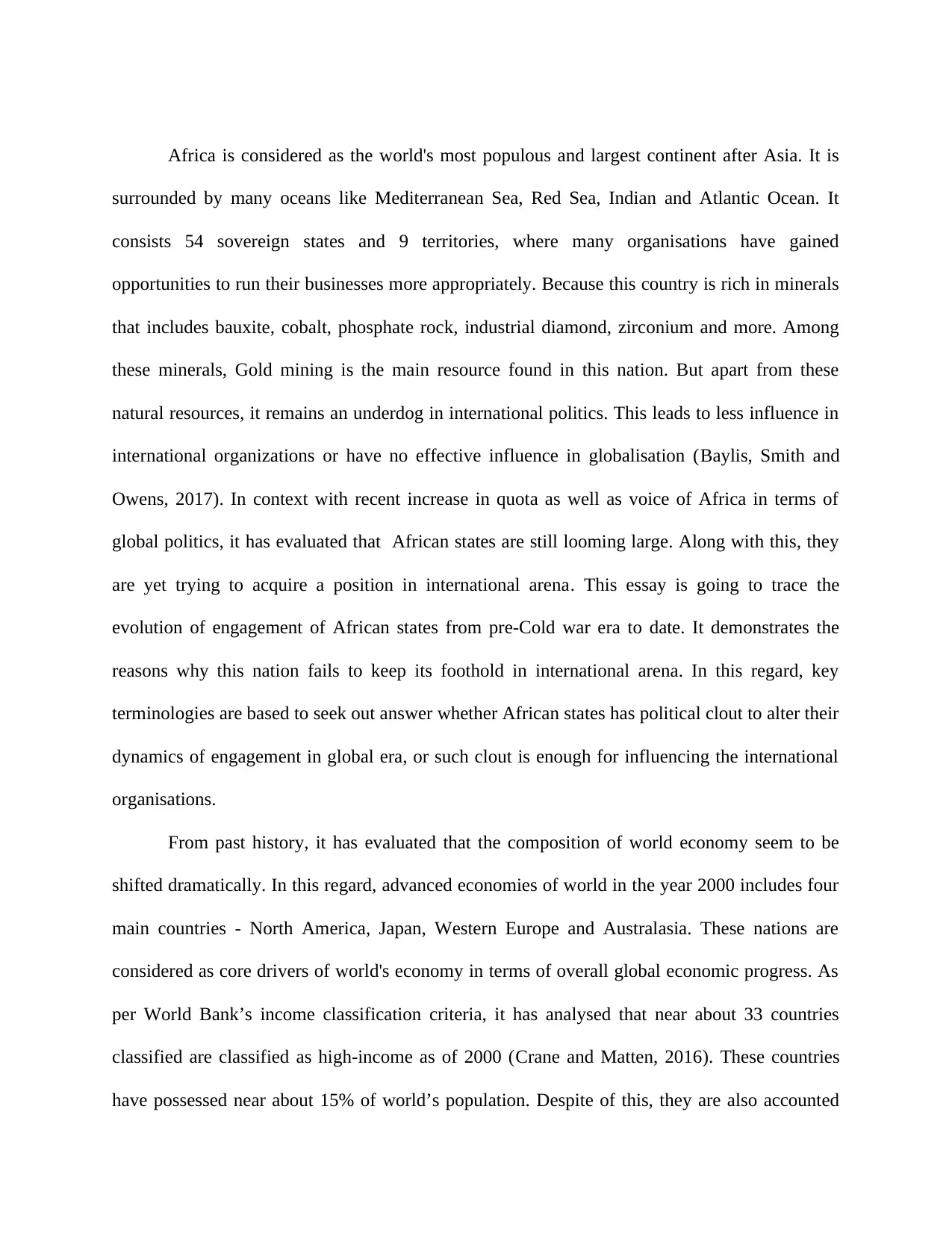
Africa is considered as the world's most populous and largest continent after Asia. It is
surrounded by many oceans like Mediterranean Sea, Red Sea, Indian and Atlantic Ocean. It
consists 54 sovereign states and 9 territories, where many organisations have gained
opportunities to run their businesses more appropriately. Because this country is rich in minerals
that includes bauxite, cobalt, phosphate rock, industrial diamond, zirconium and more. Among
these minerals, Gold mining is the main resource found in this nation. But apart from these
natural resources, it remains an underdog in international politics. This leads to less influence in
international organizations or have no effective influence in globalisation (Baylis, Smith and
Owens, 2017). In context with recent increase in quota as well as voice of Africa in terms of
global politics, it has evaluated that African states are still looming large. Along with this, they
are yet trying to acquire a position in international arena. This essay is going to trace the
evolution of engagement of African states from pre-Cold war era to date. It demonstrates the
reasons why this nation fails to keep its foothold in international arena. In this regard, key
terminologies are based to seek out answer whether African states has political clout to alter their
dynamics of engagement in global era, or such clout is enough for influencing the international
organisations.
From past history, it has evaluated that the composition of world economy seem to be
shifted dramatically. In this regard, advanced economies of world in the year 2000 includes four
main countries - North America, Japan, Western Europe and Australasia. These nations are
considered as core drivers of world's economy in terms of overall global economic progress. As
per World Bank’s income classification criteria, it has analysed that near about 33 countries
classified are classified as high-income as of 2000 (Crane and Matten, 2016). These countries
have possessed near about 15% of world’s population. Despite of this, they are also accounted
surrounded by many oceans like Mediterranean Sea, Red Sea, Indian and Atlantic Ocean. It
consists 54 sovereign states and 9 territories, where many organisations have gained
opportunities to run their businesses more appropriately. Because this country is rich in minerals
that includes bauxite, cobalt, phosphate rock, industrial diamond, zirconium and more. Among
these minerals, Gold mining is the main resource found in this nation. But apart from these
natural resources, it remains an underdog in international politics. This leads to less influence in
international organizations or have no effective influence in globalisation (Baylis, Smith and
Owens, 2017). In context with recent increase in quota as well as voice of Africa in terms of
global politics, it has evaluated that African states are still looming large. Along with this, they
are yet trying to acquire a position in international arena. This essay is going to trace the
evolution of engagement of African states from pre-Cold war era to date. It demonstrates the
reasons why this nation fails to keep its foothold in international arena. In this regard, key
terminologies are based to seek out answer whether African states has political clout to alter their
dynamics of engagement in global era, or such clout is enough for influencing the international
organisations.
From past history, it has evaluated that the composition of world economy seem to be
shifted dramatically. In this regard, advanced economies of world in the year 2000 includes four
main countries - North America, Japan, Western Europe and Australasia. These nations are
considered as core drivers of world's economy in terms of overall global economic progress. As
per World Bank’s income classification criteria, it has analysed that near about 33 countries
classified are classified as high-income as of 2000 (Crane and Matten, 2016). These countries
have possessed near about 15% of world’s population. Despite of this, they are also accounted
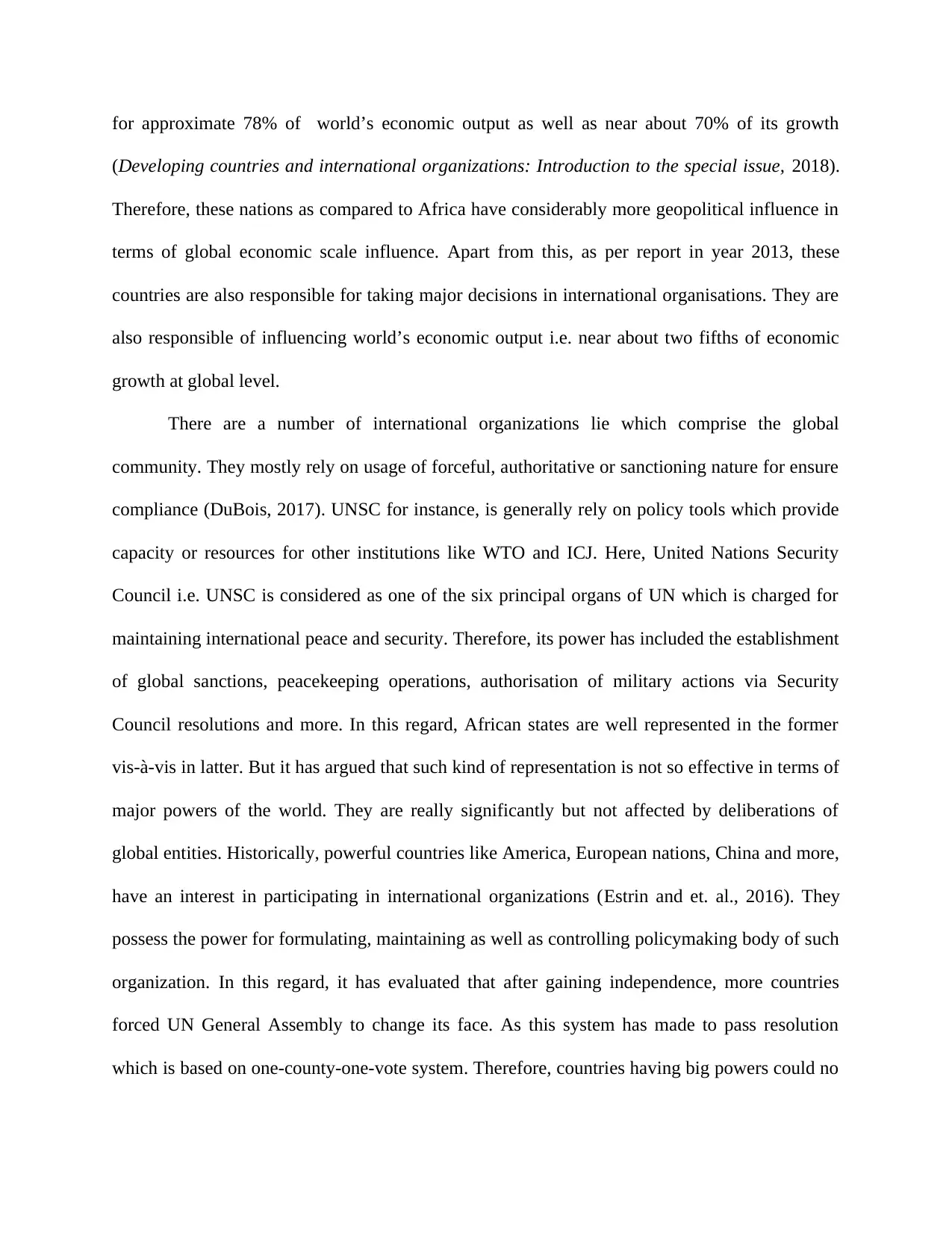
for approximate 78% of world’s economic output as well as near about 70% of its growth
(Developing countries and international organizations: Introduction to the special issue, 2018).
Therefore, these nations as compared to Africa have considerably more geopolitical influence in
terms of global economic scale influence. Apart from this, as per report in year 2013, these
countries are also responsible for taking major decisions in international organisations. They are
also responsible of influencing world’s economic output i.e. near about two fifths of economic
growth at global level.
There are a number of international organizations lie which comprise the global
community. They mostly rely on usage of forceful, authoritative or sanctioning nature for ensure
compliance (DuBois, 2017). UNSC for instance, is generally rely on policy tools which provide
capacity or resources for other institutions like WTO and ICJ. Here, United Nations Security
Council i.e. UNSC is considered as one of the six principal organs of UN which is charged for
maintaining international peace and security. Therefore, its power has included the establishment
of global sanctions, peacekeeping operations, authorisation of military actions via Security
Council resolutions and more. In this regard, African states are well represented in the former
vis-à-vis in latter. But it has argued that such kind of representation is not so effective in terms of
major powers of the world. They are really significantly but not affected by deliberations of
global entities. Historically, powerful countries like America, European nations, China and more,
have an interest in participating in international organizations (Estrin and et. al., 2016). They
possess the power for formulating, maintaining as well as controlling policymaking body of such
organization. In this regard, it has evaluated that after gaining independence, more countries
forced UN General Assembly to change its face. As this system has made to pass resolution
which is based on one-county-one-vote system. Therefore, countries having big powers could no
(Developing countries and international organizations: Introduction to the special issue, 2018).
Therefore, these nations as compared to Africa have considerably more geopolitical influence in
terms of global economic scale influence. Apart from this, as per report in year 2013, these
countries are also responsible for taking major decisions in international organisations. They are
also responsible of influencing world’s economic output i.e. near about two fifths of economic
growth at global level.
There are a number of international organizations lie which comprise the global
community. They mostly rely on usage of forceful, authoritative or sanctioning nature for ensure
compliance (DuBois, 2017). UNSC for instance, is generally rely on policy tools which provide
capacity or resources for other institutions like WTO and ICJ. Here, United Nations Security
Council i.e. UNSC is considered as one of the six principal organs of UN which is charged for
maintaining international peace and security. Therefore, its power has included the establishment
of global sanctions, peacekeeping operations, authorisation of military actions via Security
Council resolutions and more. In this regard, African states are well represented in the former
vis-à-vis in latter. But it has argued that such kind of representation is not so effective in terms of
major powers of the world. They are really significantly but not affected by deliberations of
global entities. Historically, powerful countries like America, European nations, China and more,
have an interest in participating in international organizations (Estrin and et. al., 2016). They
possess the power for formulating, maintaining as well as controlling policymaking body of such
organization. In this regard, it has evaluated that after gaining independence, more countries
forced UN General Assembly to change its face. As this system has made to pass resolution
which is based on one-county-one-vote system. Therefore, countries having big powers could no
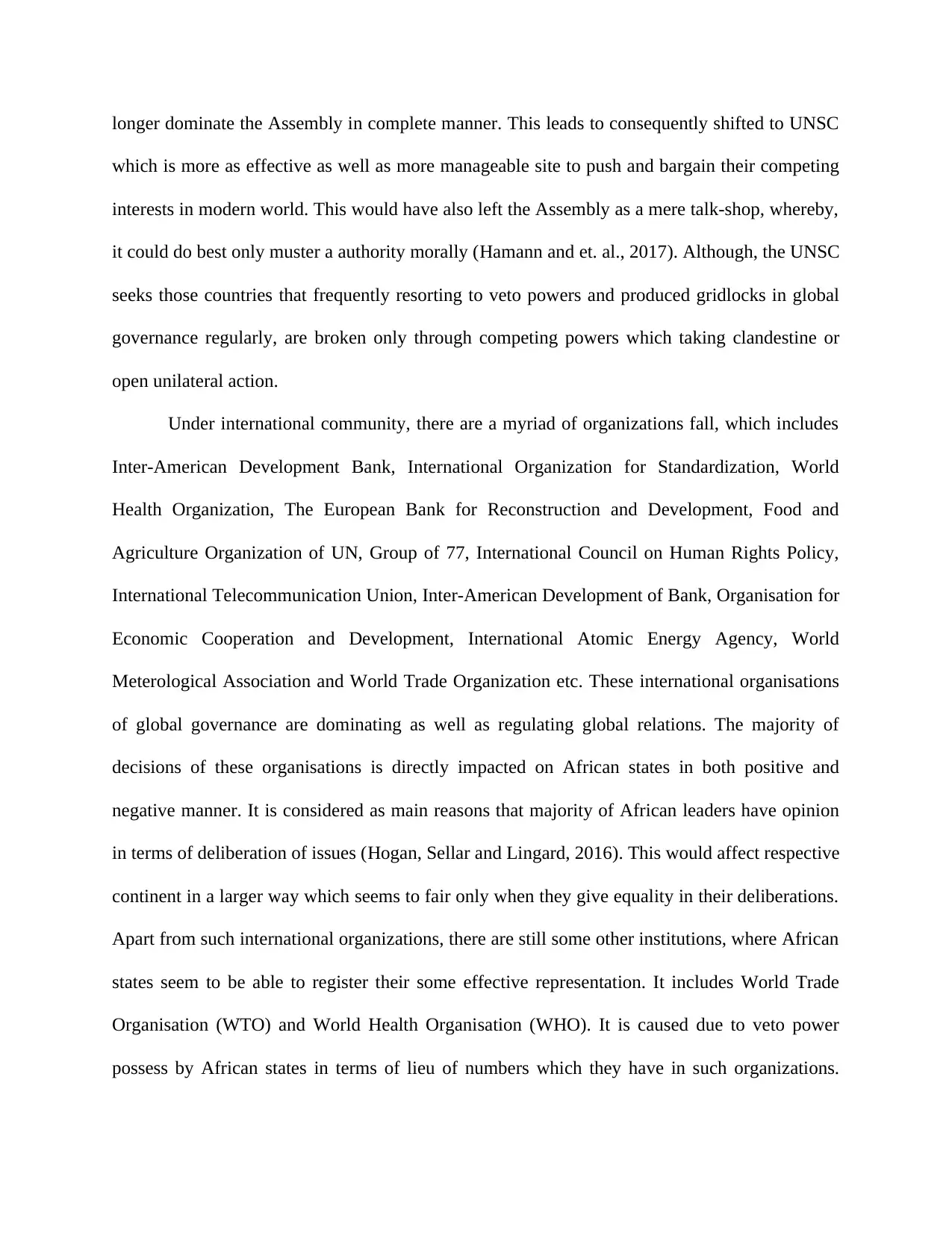
longer dominate the Assembly in complete manner. This leads to consequently shifted to UNSC
which is more as effective as well as more manageable site to push and bargain their competing
interests in modern world. This would have also left the Assembly as a mere talk-shop, whereby,
it could do best only muster a authority morally (Hamann and et. al., 2017). Although, the UNSC
seeks those countries that frequently resorting to veto powers and produced gridlocks in global
governance regularly, are broken only through competing powers which taking clandestine or
open unilateral action.
Under international community, there are a myriad of organizations fall, which includes
Inter-American Development Bank, International Organization for Standardization, World
Health Organization, The European Bank for Reconstruction and Development, Food and
Agriculture Organization of UN, Group of 77, International Council on Human Rights Policy,
International Telecommunication Union, Inter-American Development of Bank, Organisation for
Economic Cooperation and Development, International Atomic Energy Agency, World
Meterological Association and World Trade Organization etc. These international organisations
of global governance are dominating as well as regulating global relations. The majority of
decisions of these organisations is directly impacted on African states in both positive and
negative manner. It is considered as main reasons that majority of African leaders have opinion
in terms of deliberation of issues (Hogan, Sellar and Lingard, 2016). This would affect respective
continent in a larger way which seems to fair only when they give equality in their deliberations.
Apart from such international organizations, there are still some other institutions, where African
states seem to be able to register their some effective representation. It includes World Trade
Organisation (WTO) and World Health Organisation (WHO). It is caused due to veto power
possess by African states in terms of lieu of numbers which they have in such organizations.
which is more as effective as well as more manageable site to push and bargain their competing
interests in modern world. This would have also left the Assembly as a mere talk-shop, whereby,
it could do best only muster a authority morally (Hamann and et. al., 2017). Although, the UNSC
seeks those countries that frequently resorting to veto powers and produced gridlocks in global
governance regularly, are broken only through competing powers which taking clandestine or
open unilateral action.
Under international community, there are a myriad of organizations fall, which includes
Inter-American Development Bank, International Organization for Standardization, World
Health Organization, The European Bank for Reconstruction and Development, Food and
Agriculture Organization of UN, Group of 77, International Council on Human Rights Policy,
International Telecommunication Union, Inter-American Development of Bank, Organisation for
Economic Cooperation and Development, International Atomic Energy Agency, World
Meterological Association and World Trade Organization etc. These international organisations
of global governance are dominating as well as regulating global relations. The majority of
decisions of these organisations is directly impacted on African states in both positive and
negative manner. It is considered as main reasons that majority of African leaders have opinion
in terms of deliberation of issues (Hogan, Sellar and Lingard, 2016). This would affect respective
continent in a larger way which seems to fair only when they give equality in their deliberations.
Apart from such international organizations, there are still some other institutions, where African
states seem to be able to register their some effective representation. It includes World Trade
Organisation (WTO) and World Health Organisation (WHO). It is caused due to veto power
possess by African states in terms of lieu of numbers which they have in such organizations.
Paraphrase This Document
Need a fresh take? Get an instant paraphrase of this document with our AI Paraphraser
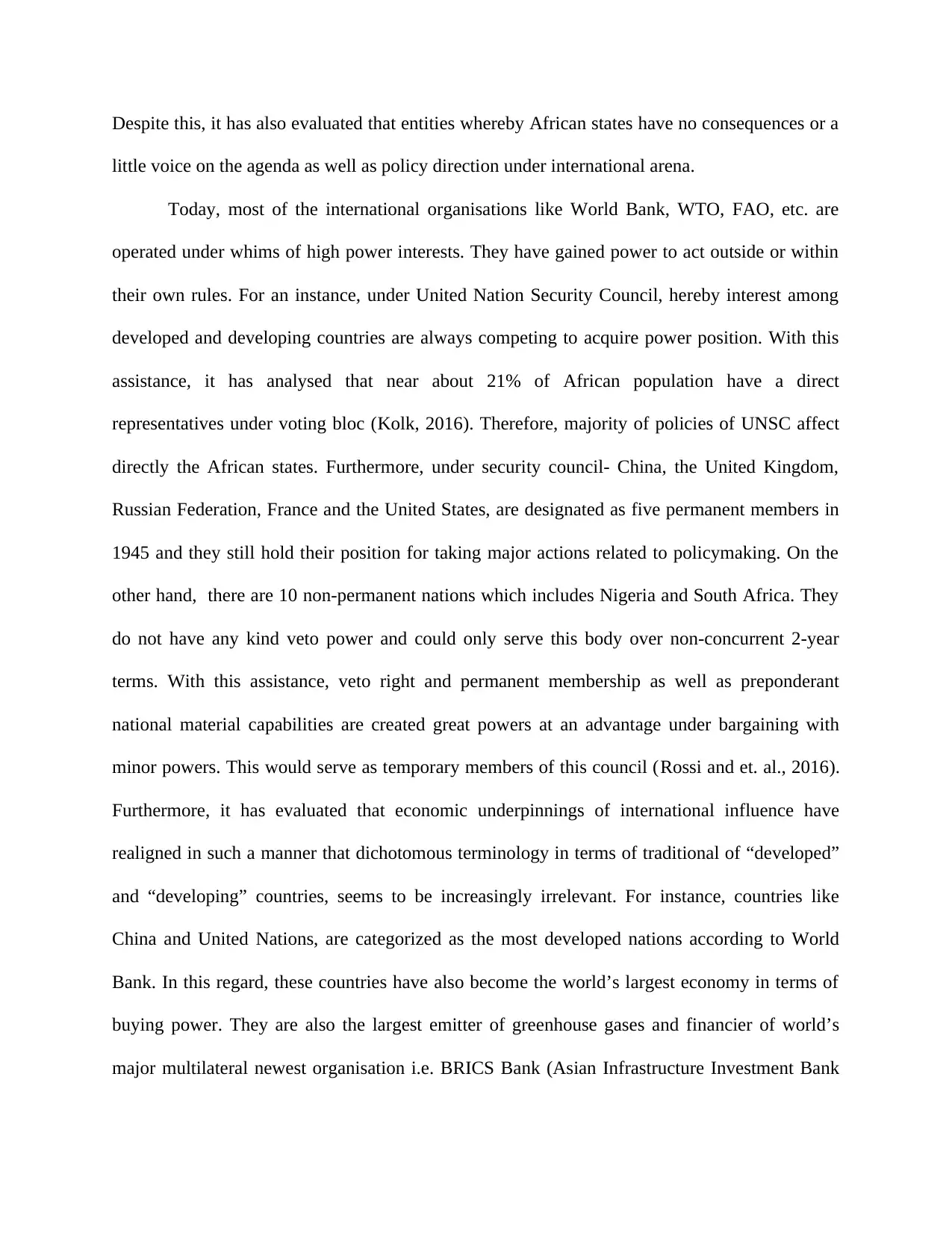
Despite this, it has also evaluated that entities whereby African states have no consequences or a
little voice on the agenda as well as policy direction under international arena.
Today, most of the international organisations like World Bank, WTO, FAO, etc. are
operated under whims of high power interests. They have gained power to act outside or within
their own rules. For an instance, under United Nation Security Council, hereby interest among
developed and developing countries are always competing to acquire power position. With this
assistance, it has analysed that near about 21% of African population have a direct
representatives under voting bloc (Kolk, 2016). Therefore, majority of policies of UNSC affect
directly the African states. Furthermore, under security council- China, the United Kingdom,
Russian Federation, France and the United States, are designated as five permanent members in
1945 and they still hold their position for taking major actions related to policymaking. On the
other hand, there are 10 non-permanent nations which includes Nigeria and South Africa. They
do not have any kind veto power and could only serve this body over non-concurrent 2-year
terms. With this assistance, veto right and permanent membership as well as preponderant
national material capabilities are created great powers at an advantage under bargaining with
minor powers. This would serve as temporary members of this council (Rossi and et. al., 2016).
Furthermore, it has evaluated that economic underpinnings of international influence have
realigned in such a manner that dichotomous terminology in terms of traditional of “developed”
and “developing” countries, seems to be increasingly irrelevant. For instance, countries like
China and United Nations, are categorized as the most developed nations according to World
Bank. In this regard, these countries have also become the world’s largest economy in terms of
buying power. They are also the largest emitter of greenhouse gases and financier of world’s
major multilateral newest organisation i.e. BRICS Bank (Asian Infrastructure Investment Bank
little voice on the agenda as well as policy direction under international arena.
Today, most of the international organisations like World Bank, WTO, FAO, etc. are
operated under whims of high power interests. They have gained power to act outside or within
their own rules. For an instance, under United Nation Security Council, hereby interest among
developed and developing countries are always competing to acquire power position. With this
assistance, it has analysed that near about 21% of African population have a direct
representatives under voting bloc (Kolk, 2016). Therefore, majority of policies of UNSC affect
directly the African states. Furthermore, under security council- China, the United Kingdom,
Russian Federation, France and the United States, are designated as five permanent members in
1945 and they still hold their position for taking major actions related to policymaking. On the
other hand, there are 10 non-permanent nations which includes Nigeria and South Africa. They
do not have any kind veto power and could only serve this body over non-concurrent 2-year
terms. With this assistance, veto right and permanent membership as well as preponderant
national material capabilities are created great powers at an advantage under bargaining with
minor powers. This would serve as temporary members of this council (Rossi and et. al., 2016).
Furthermore, it has evaluated that economic underpinnings of international influence have
realigned in such a manner that dichotomous terminology in terms of traditional of “developed”
and “developing” countries, seems to be increasingly irrelevant. For instance, countries like
China and United Nations, are categorized as the most developed nations according to World
Bank. In this regard, these countries have also become the world’s largest economy in terms of
buying power. They are also the largest emitter of greenhouse gases and financier of world’s
major multilateral newest organisation i.e. BRICS Bank (Asian Infrastructure Investment Bank
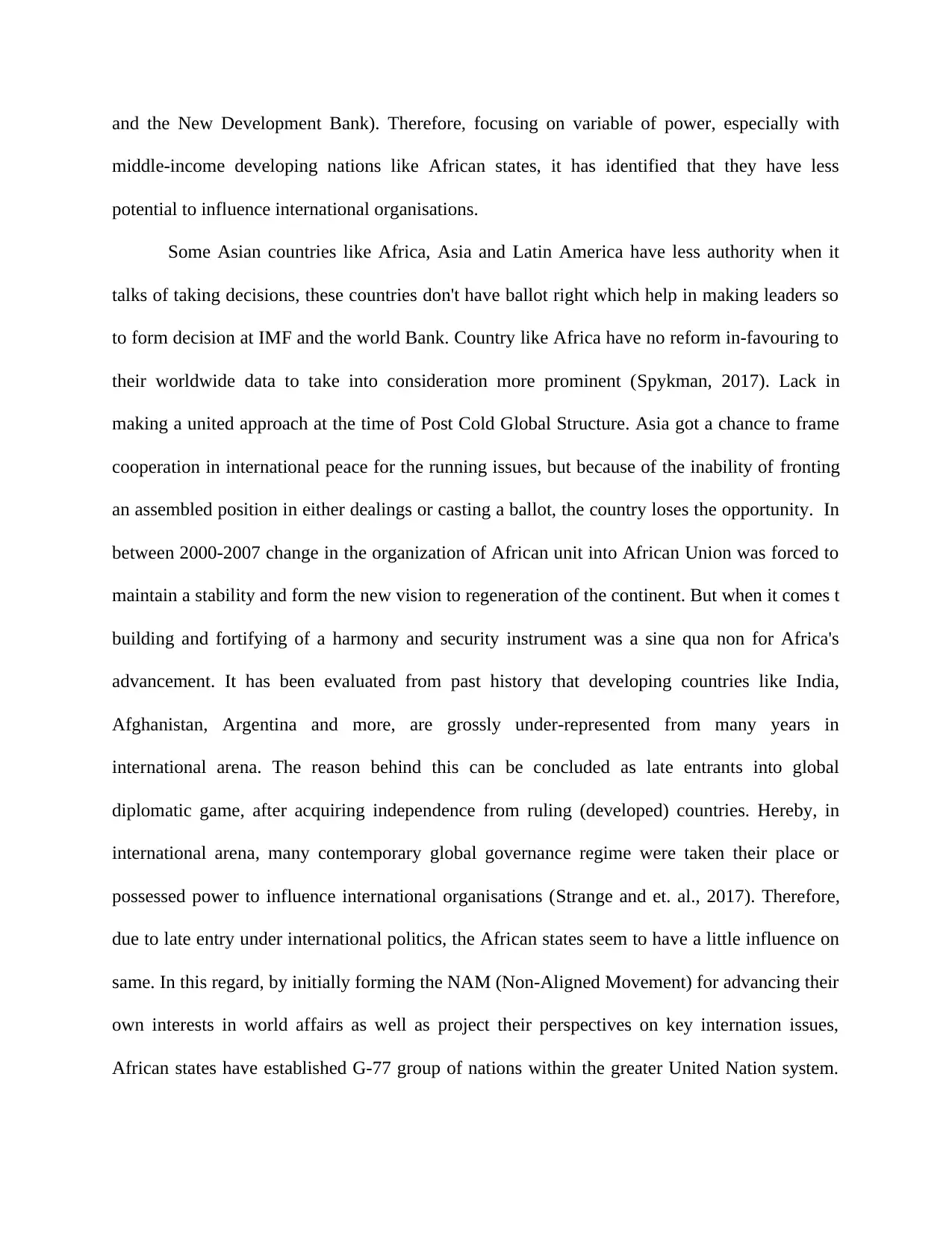
and the New Development Bank). Therefore, focusing on variable of power, especially with
middle-income developing nations like African states, it has identified that they have less
potential to influence international organisations.
Some Asian countries like Africa, Asia and Latin America have less authority when it
talks of taking decisions, these countries don't have ballot right which help in making leaders so
to form decision at IMF and the world Bank. Country like Africa have no reform in-favouring to
their worldwide data to take into consideration more prominent (Spykman, 2017). Lack in
making a united approach at the time of Post Cold Global Structure. Asia got a chance to frame
cooperation in international peace for the running issues, but because of the inability of fronting
an assembled position in either dealings or casting a ballot, the country loses the opportunity. In
between 2000-2007 change in the organization of African unit into African Union was forced to
maintain a stability and form the new vision to regeneration of the continent. But when it comes t
building and fortifying of a harmony and security instrument was a sine qua non for Africa's
advancement. It has been evaluated from past history that developing countries like India,
Afghanistan, Argentina and more, are grossly under-represented from many years in
international arena. The reason behind this can be concluded as late entrants into global
diplomatic game, after acquiring independence from ruling (developed) countries. Hereby, in
international arena, many contemporary global governance regime were taken their place or
possessed power to influence international organisations (Strange and et. al., 2017). Therefore,
due to late entry under international politics, the African states seem to have a little influence on
same. In this regard, by initially forming the NAM (Non-Aligned Movement) for advancing their
own interests in world affairs as well as project their perspectives on key internation issues,
African states have established G-77 group of nations within the greater United Nation system.
middle-income developing nations like African states, it has identified that they have less
potential to influence international organisations.
Some Asian countries like Africa, Asia and Latin America have less authority when it
talks of taking decisions, these countries don't have ballot right which help in making leaders so
to form decision at IMF and the world Bank. Country like Africa have no reform in-favouring to
their worldwide data to take into consideration more prominent (Spykman, 2017). Lack in
making a united approach at the time of Post Cold Global Structure. Asia got a chance to frame
cooperation in international peace for the running issues, but because of the inability of fronting
an assembled position in either dealings or casting a ballot, the country loses the opportunity. In
between 2000-2007 change in the organization of African unit into African Union was forced to
maintain a stability and form the new vision to regeneration of the continent. But when it comes t
building and fortifying of a harmony and security instrument was a sine qua non for Africa's
advancement. It has been evaluated from past history that developing countries like India,
Afghanistan, Argentina and more, are grossly under-represented from many years in
international arena. The reason behind this can be concluded as late entrants into global
diplomatic game, after acquiring independence from ruling (developed) countries. Hereby, in
international arena, many contemporary global governance regime were taken their place or
possessed power to influence international organisations (Strange and et. al., 2017). Therefore,
due to late entry under international politics, the African states seem to have a little influence on
same. In this regard, by initially forming the NAM (Non-Aligned Movement) for advancing their
own interests in world affairs as well as project their perspectives on key internation issues,
African states have established G-77 group of nations within the greater United Nation system.
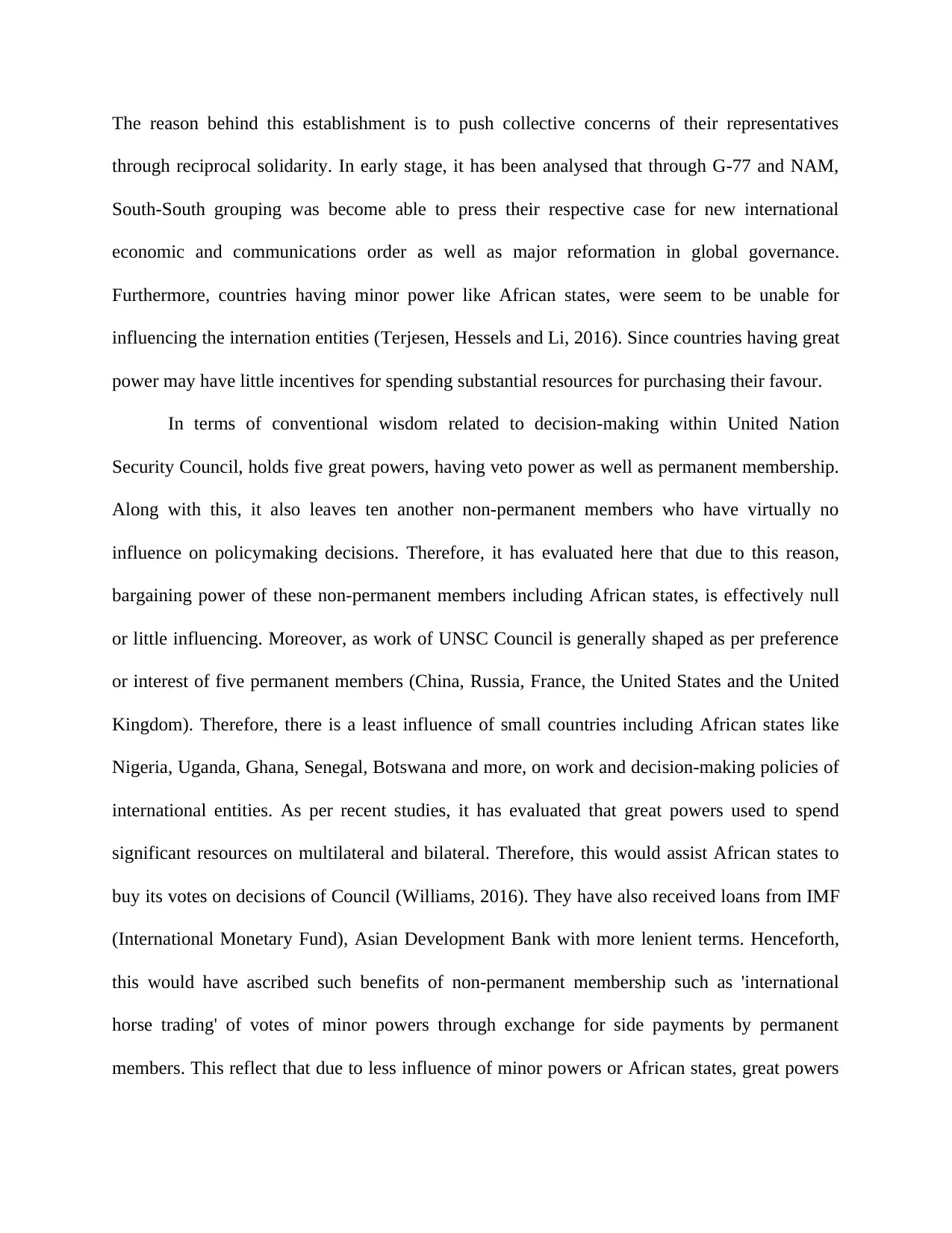
The reason behind this establishment is to push collective concerns of their representatives
through reciprocal solidarity. In early stage, it has been analysed that through G-77 and NAM,
South-South grouping was become able to press their respective case for new international
economic and communications order as well as major reformation in global governance.
Furthermore, countries having minor power like African states, were seem to be unable for
influencing the internation entities (Terjesen, Hessels and Li, 2016). Since countries having great
power may have little incentives for spending substantial resources for purchasing their favour.
In terms of conventional wisdom related to decision-making within United Nation
Security Council, holds five great powers, having veto power as well as permanent membership.
Along with this, it also leaves ten another non-permanent members who have virtually no
influence on policymaking decisions. Therefore, it has evaluated here that due to this reason,
bargaining power of these non-permanent members including African states, is effectively null
or little influencing. Moreover, as work of UNSC Council is generally shaped as per preference
or interest of five permanent members (China, Russia, France, the United States and the United
Kingdom). Therefore, there is a least influence of small countries including African states like
Nigeria, Uganda, Ghana, Senegal, Botswana and more, on work and decision-making policies of
international entities. As per recent studies, it has evaluated that great powers used to spend
significant resources on multilateral and bilateral. Therefore, this would assist African states to
buy its votes on decisions of Council (Williams, 2016). They have also received loans from IMF
(International Monetary Fund), Asian Development Bank with more lenient terms. Henceforth,
this would have ascribed such benefits of non-permanent membership such as 'international
horse trading' of votes of minor powers through exchange for side payments by permanent
members. This reflect that due to less influence of minor powers or African states, great powers
through reciprocal solidarity. In early stage, it has been analysed that through G-77 and NAM,
South-South grouping was become able to press their respective case for new international
economic and communications order as well as major reformation in global governance.
Furthermore, countries having minor power like African states, were seem to be unable for
influencing the internation entities (Terjesen, Hessels and Li, 2016). Since countries having great
power may have little incentives for spending substantial resources for purchasing their favour.
In terms of conventional wisdom related to decision-making within United Nation
Security Council, holds five great powers, having veto power as well as permanent membership.
Along with this, it also leaves ten another non-permanent members who have virtually no
influence on policymaking decisions. Therefore, it has evaluated here that due to this reason,
bargaining power of these non-permanent members including African states, is effectively null
or little influencing. Moreover, as work of UNSC Council is generally shaped as per preference
or interest of five permanent members (China, Russia, France, the United States and the United
Kingdom). Therefore, there is a least influence of small countries including African states like
Nigeria, Uganda, Ghana, Senegal, Botswana and more, on work and decision-making policies of
international entities. As per recent studies, it has evaluated that great powers used to spend
significant resources on multilateral and bilateral. Therefore, this would assist African states to
buy its votes on decisions of Council (Williams, 2016). They have also received loans from IMF
(International Monetary Fund), Asian Development Bank with more lenient terms. Henceforth,
this would have ascribed such benefits of non-permanent membership such as 'international
horse trading' of votes of minor powers through exchange for side payments by permanent
members. This reflect that due to less influence of minor powers or African states, great powers
Secure Best Marks with AI Grader
Need help grading? Try our AI Grader for instant feedback on your assignments.
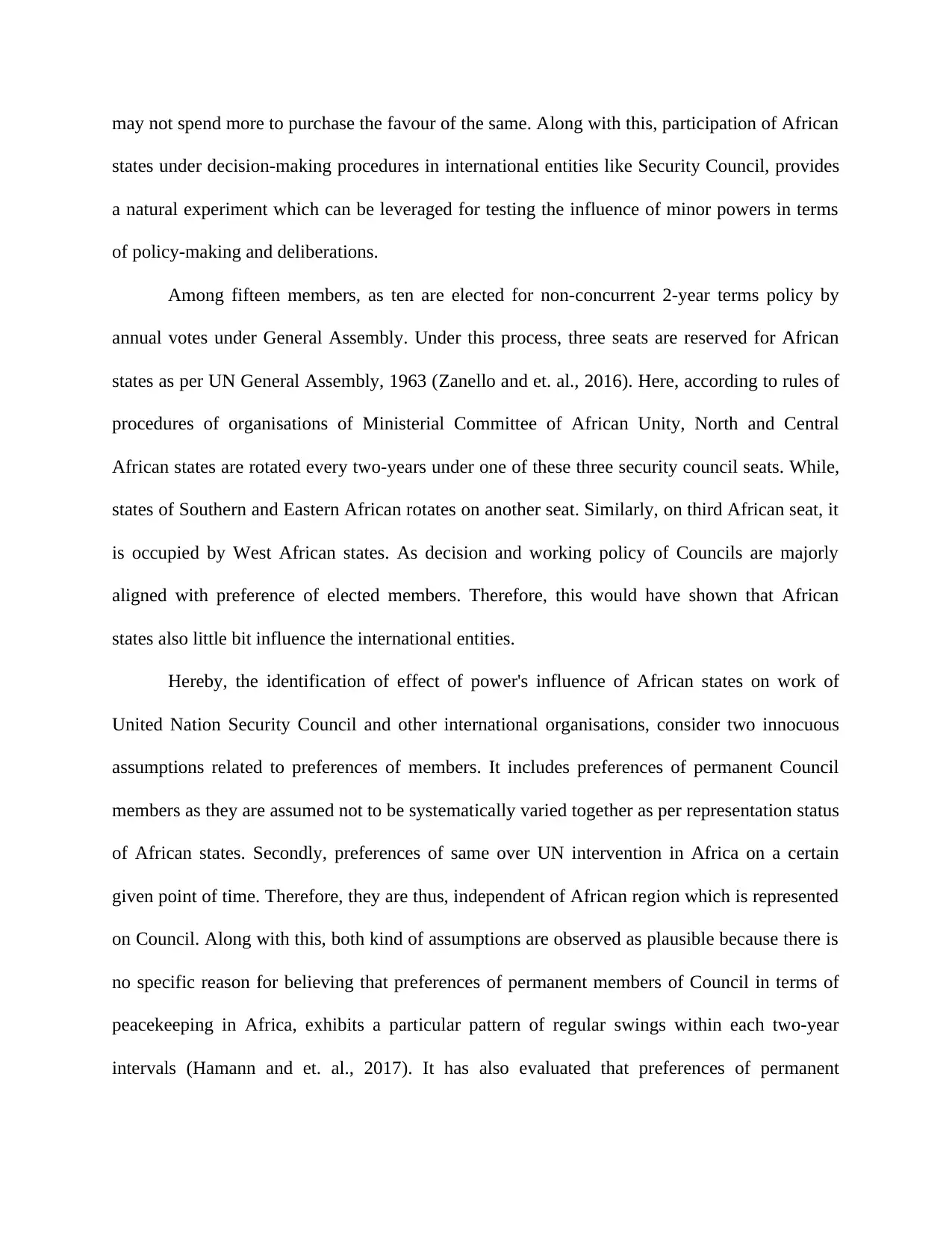
may not spend more to purchase the favour of the same. Along with this, participation of African
states under decision-making procedures in international entities like Security Council, provides
a natural experiment which can be leveraged for testing the influence of minor powers in terms
of policy-making and deliberations.
Among fifteen members, as ten are elected for non-concurrent 2-year terms policy by
annual votes under General Assembly. Under this process, three seats are reserved for African
states as per UN General Assembly, 1963 (Zanello and et. al., 2016). Here, according to rules of
procedures of organisations of Ministerial Committee of African Unity, North and Central
African states are rotated every two-years under one of these three security council seats. While,
states of Southern and Eastern African rotates on another seat. Similarly, on third African seat, it
is occupied by West African states. As decision and working policy of Councils are majorly
aligned with preference of elected members. Therefore, this would have shown that African
states also little bit influence the international entities.
Hereby, the identification of effect of power's influence of African states on work of
United Nation Security Council and other international organisations, consider two innocuous
assumptions related to preferences of members. It includes preferences of permanent Council
members as they are assumed not to be systematically varied together as per representation status
of African states. Secondly, preferences of same over UN intervention in Africa on a certain
given point of time. Therefore, they are thus, independent of African region which is represented
on Council. Along with this, both kind of assumptions are observed as plausible because there is
no specific reason for believing that preferences of permanent members of Council in terms of
peacekeeping in Africa, exhibits a particular pattern of regular swings within each two-year
intervals (Hamann and et. al., 2017). It has also evaluated that preferences of permanent
states under decision-making procedures in international entities like Security Council, provides
a natural experiment which can be leveraged for testing the influence of minor powers in terms
of policy-making and deliberations.
Among fifteen members, as ten are elected for non-concurrent 2-year terms policy by
annual votes under General Assembly. Under this process, three seats are reserved for African
states as per UN General Assembly, 1963 (Zanello and et. al., 2016). Here, according to rules of
procedures of organisations of Ministerial Committee of African Unity, North and Central
African states are rotated every two-years under one of these three security council seats. While,
states of Southern and Eastern African rotates on another seat. Similarly, on third African seat, it
is occupied by West African states. As decision and working policy of Councils are majorly
aligned with preference of elected members. Therefore, this would have shown that African
states also little bit influence the international entities.
Hereby, the identification of effect of power's influence of African states on work of
United Nation Security Council and other international organisations, consider two innocuous
assumptions related to preferences of members. It includes preferences of permanent Council
members as they are assumed not to be systematically varied together as per representation status
of African states. Secondly, preferences of same over UN intervention in Africa on a certain
given point of time. Therefore, they are thus, independent of African region which is represented
on Council. Along with this, both kind of assumptions are observed as plausible because there is
no specific reason for believing that preferences of permanent members of Council in terms of
peacekeeping in Africa, exhibits a particular pattern of regular swings within each two-year
intervals (Hamann and et. al., 2017). It has also evaluated that preferences of permanent
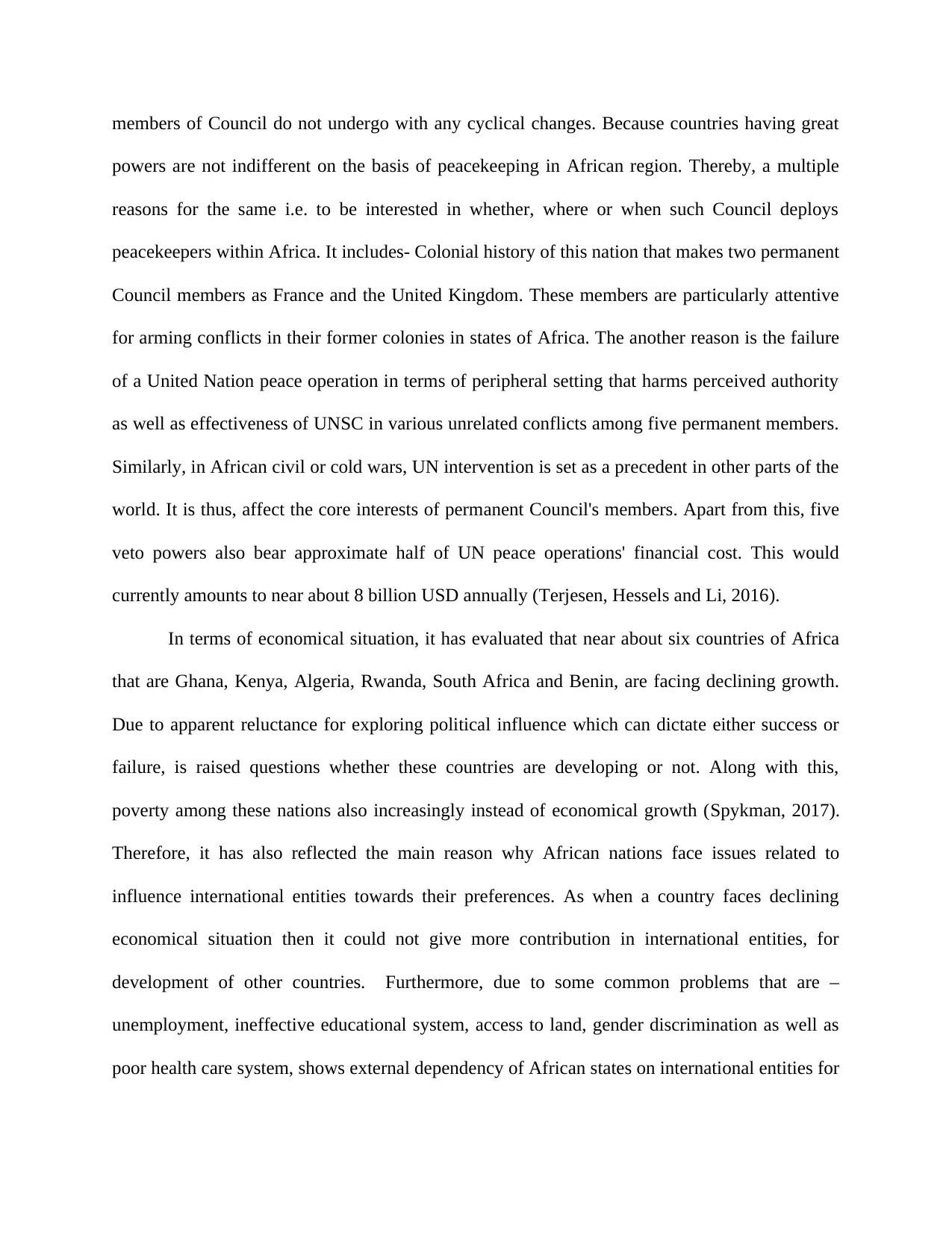
members of Council do not undergo with any cyclical changes. Because countries having great
powers are not indifferent on the basis of peacekeeping in African region. Thereby, a multiple
reasons for the same i.e. to be interested in whether, where or when such Council deploys
peacekeepers within Africa. It includes- Colonial history of this nation that makes two permanent
Council members as France and the United Kingdom. These members are particularly attentive
for arming conflicts in their former colonies in states of Africa. The another reason is the failure
of a United Nation peace operation in terms of peripheral setting that harms perceived authority
as well as effectiveness of UNSC in various unrelated conflicts among five permanent members.
Similarly, in African civil or cold wars, UN intervention is set as a precedent in other parts of the
world. It is thus, affect the core interests of permanent Council's members. Apart from this, five
veto powers also bear approximate half of UN peace operations' financial cost. This would
currently amounts to near about 8 billion USD annually (Terjesen, Hessels and Li, 2016).
In terms of economical situation, it has evaluated that near about six countries of Africa
that are Ghana, Kenya, Algeria, Rwanda, South Africa and Benin, are facing declining growth.
Due to apparent reluctance for exploring political influence which can dictate either success or
failure, is raised questions whether these countries are developing or not. Along with this,
poverty among these nations also increasingly instead of economical growth (Spykman, 2017).
Therefore, it has also reflected the main reason why African nations face issues related to
influence international entities towards their preferences. As when a country faces declining
economical situation then it could not give more contribution in international entities, for
development of other countries. Furthermore, due to some common problems that are –
unemployment, ineffective educational system, access to land, gender discrimination as well as
poor health care system, shows external dependency of African states on international entities for
powers are not indifferent on the basis of peacekeeping in African region. Thereby, a multiple
reasons for the same i.e. to be interested in whether, where or when such Council deploys
peacekeepers within Africa. It includes- Colonial history of this nation that makes two permanent
Council members as France and the United Kingdom. These members are particularly attentive
for arming conflicts in their former colonies in states of Africa. The another reason is the failure
of a United Nation peace operation in terms of peripheral setting that harms perceived authority
as well as effectiveness of UNSC in various unrelated conflicts among five permanent members.
Similarly, in African civil or cold wars, UN intervention is set as a precedent in other parts of the
world. It is thus, affect the core interests of permanent Council's members. Apart from this, five
veto powers also bear approximate half of UN peace operations' financial cost. This would
currently amounts to near about 8 billion USD annually (Terjesen, Hessels and Li, 2016).
In terms of economical situation, it has evaluated that near about six countries of Africa
that are Ghana, Kenya, Algeria, Rwanda, South Africa and Benin, are facing declining growth.
Due to apparent reluctance for exploring political influence which can dictate either success or
failure, is raised questions whether these countries are developing or not. Along with this,
poverty among these nations also increasingly instead of economical growth (Spykman, 2017).
Therefore, it has also reflected the main reason why African nations face issues related to
influence international entities towards their preferences. As when a country faces declining
economical situation then it could not give more contribution in international entities, for
development of other countries. Furthermore, due to some common problems that are –
unemployment, ineffective educational system, access to land, gender discrimination as well as
poor health care system, shows external dependency of African states on international entities for
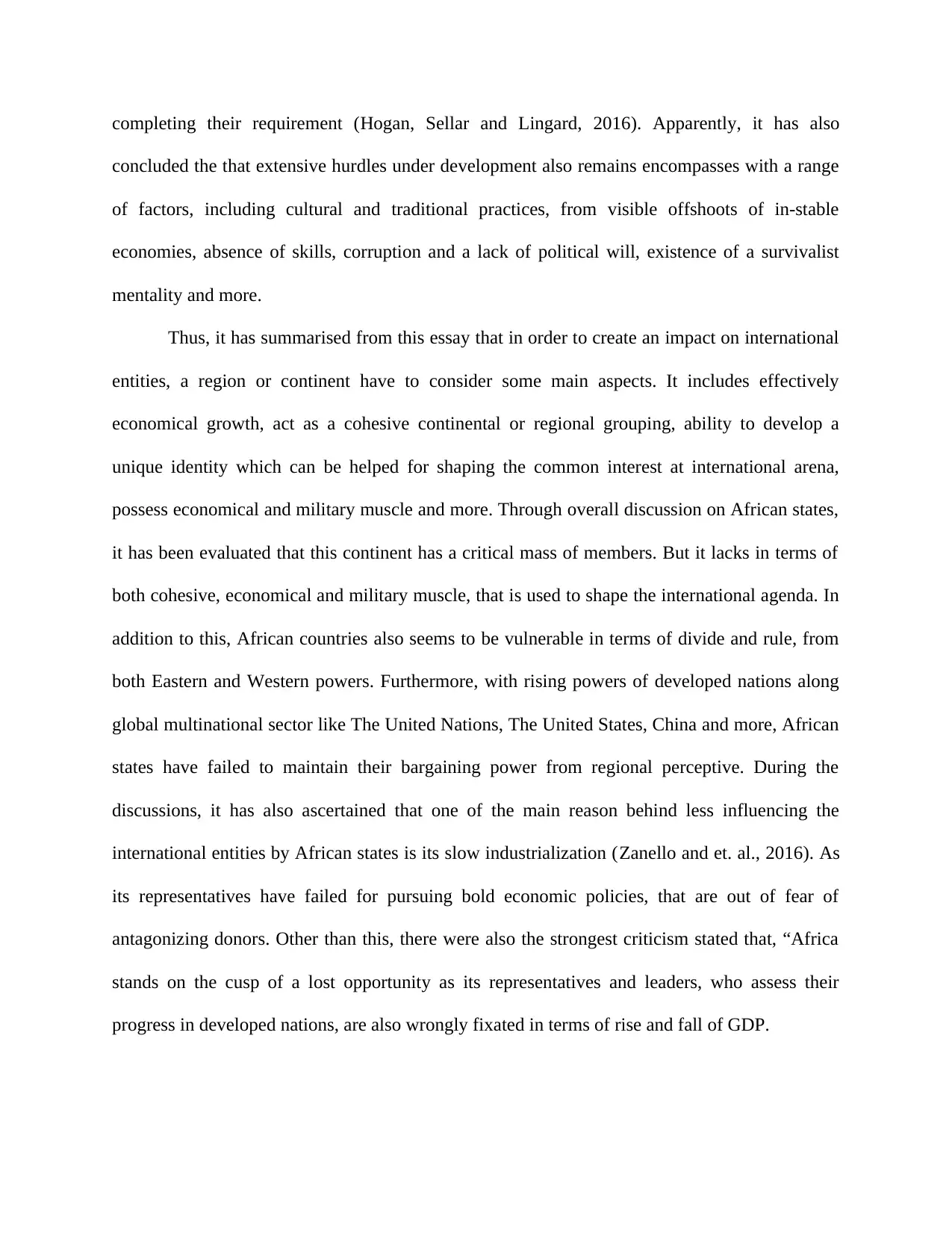
completing their requirement (Hogan, Sellar and Lingard, 2016). Apparently, it has also
concluded the that extensive hurdles under development also remains encompasses with a range
of factors, including cultural and traditional practices, from visible offshoots of in-stable
economies, absence of skills, corruption and a lack of political will, existence of a survivalist
mentality and more.
Thus, it has summarised from this essay that in order to create an impact on international
entities, a region or continent have to consider some main aspects. It includes effectively
economical growth, act as a cohesive continental or regional grouping, ability to develop a
unique identity which can be helped for shaping the common interest at international arena,
possess economical and military muscle and more. Through overall discussion on African states,
it has been evaluated that this continent has a critical mass of members. But it lacks in terms of
both cohesive, economical and military muscle, that is used to shape the international agenda. In
addition to this, African countries also seems to be vulnerable in terms of divide and rule, from
both Eastern and Western powers. Furthermore, with rising powers of developed nations along
global multinational sector like The United Nations, The United States, China and more, African
states have failed to maintain their bargaining power from regional perceptive. During the
discussions, it has also ascertained that one of the main reason behind less influencing the
international entities by African states is its slow industrialization (Zanello and et. al., 2016). As
its representatives have failed for pursuing bold economic policies, that are out of fear of
antagonizing donors. Other than this, there were also the strongest criticism stated that, “Africa
stands on the cusp of a lost opportunity as its representatives and leaders, who assess their
progress in developed nations, are also wrongly fixated in terms of rise and fall of GDP.
concluded the that extensive hurdles under development also remains encompasses with a range
of factors, including cultural and traditional practices, from visible offshoots of in-stable
economies, absence of skills, corruption and a lack of political will, existence of a survivalist
mentality and more.
Thus, it has summarised from this essay that in order to create an impact on international
entities, a region or continent have to consider some main aspects. It includes effectively
economical growth, act as a cohesive continental or regional grouping, ability to develop a
unique identity which can be helped for shaping the common interest at international arena,
possess economical and military muscle and more. Through overall discussion on African states,
it has been evaluated that this continent has a critical mass of members. But it lacks in terms of
both cohesive, economical and military muscle, that is used to shape the international agenda. In
addition to this, African countries also seems to be vulnerable in terms of divide and rule, from
both Eastern and Western powers. Furthermore, with rising powers of developed nations along
global multinational sector like The United Nations, The United States, China and more, African
states have failed to maintain their bargaining power from regional perceptive. During the
discussions, it has also ascertained that one of the main reason behind less influencing the
international entities by African states is its slow industrialization (Zanello and et. al., 2016). As
its representatives have failed for pursuing bold economic policies, that are out of fear of
antagonizing donors. Other than this, there were also the strongest criticism stated that, “Africa
stands on the cusp of a lost opportunity as its representatives and leaders, who assess their
progress in developed nations, are also wrongly fixated in terms of rise and fall of GDP.
Paraphrase This Document
Need a fresh take? Get an instant paraphrase of this document with our AI Paraphraser
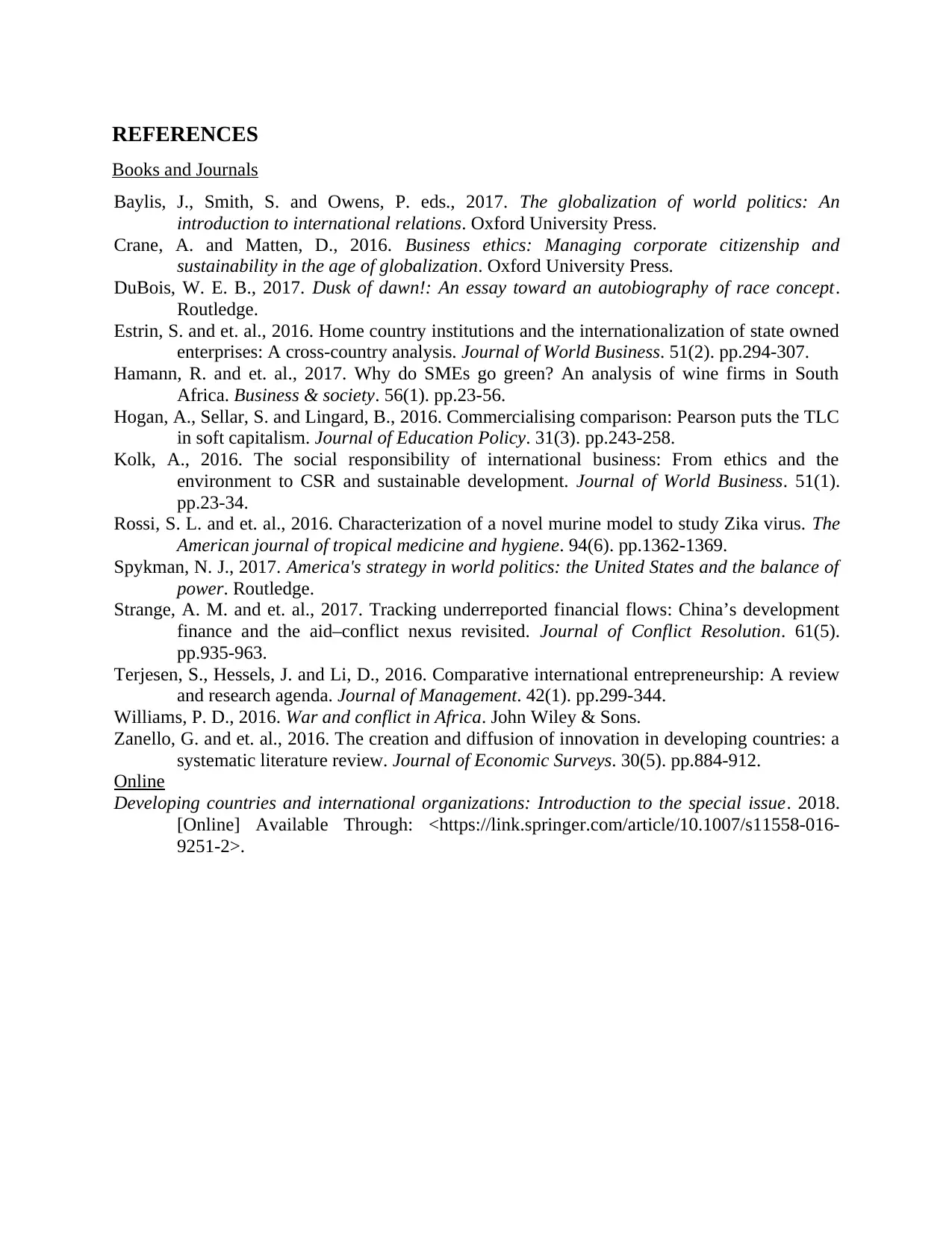
REFERENCES
Books and Journals
Baylis, J., Smith, S. and Owens, P. eds., 2017. The globalization of world politics: An
introduction to international relations. Oxford University Press.
Crane, A. and Matten, D., 2016. Business ethics: Managing corporate citizenship and
sustainability in the age of globalization. Oxford University Press.
DuBois, W. E. B., 2017. Dusk of dawn!: An essay toward an autobiography of race concept.
Routledge.
Estrin, S. and et. al., 2016. Home country institutions and the internationalization of state owned
enterprises: A cross-country analysis. Journal of World Business. 51(2). pp.294-307.
Hamann, R. and et. al., 2017. Why do SMEs go green? An analysis of wine firms in South
Africa. Business & society. 56(1). pp.23-56.
Hogan, A., Sellar, S. and Lingard, B., 2016. Commercialising comparison: Pearson puts the TLC
in soft capitalism. Journal of Education Policy. 31(3). pp.243-258.
Kolk, A., 2016. The social responsibility of international business: From ethics and the
environment to CSR and sustainable development. Journal of World Business. 51(1).
pp.23-34.
Rossi, S. L. and et. al., 2016. Characterization of a novel murine model to study Zika virus. The
American journal of tropical medicine and hygiene. 94(6). pp.1362-1369.
Spykman, N. J., 2017. America's strategy in world politics: the United States and the balance of
power. Routledge.
Strange, A. M. and et. al., 2017. Tracking underreported financial flows: China’s development
finance and the aid–conflict nexus revisited. Journal of Conflict Resolution. 61(5).
pp.935-963.
Terjesen, S., Hessels, J. and Li, D., 2016. Comparative international entrepreneurship: A review
and research agenda. Journal of Management. 42(1). pp.299-344.
Williams, P. D., 2016. War and conflict in Africa. John Wiley & Sons.
Zanello, G. and et. al., 2016. The creation and diffusion of innovation in developing countries: a
systematic literature review. Journal of Economic Surveys. 30(5). pp.884-912.
Online
Developing countries and international organizations: Introduction to the special issue. 2018.
[Online] Available Through: <https://link.springer.com/article/10.1007/s11558-016-
9251-2>.
Books and Journals
Baylis, J., Smith, S. and Owens, P. eds., 2017. The globalization of world politics: An
introduction to international relations. Oxford University Press.
Crane, A. and Matten, D., 2016. Business ethics: Managing corporate citizenship and
sustainability in the age of globalization. Oxford University Press.
DuBois, W. E. B., 2017. Dusk of dawn!: An essay toward an autobiography of race concept.
Routledge.
Estrin, S. and et. al., 2016. Home country institutions and the internationalization of state owned
enterprises: A cross-country analysis. Journal of World Business. 51(2). pp.294-307.
Hamann, R. and et. al., 2017. Why do SMEs go green? An analysis of wine firms in South
Africa. Business & society. 56(1). pp.23-56.
Hogan, A., Sellar, S. and Lingard, B., 2016. Commercialising comparison: Pearson puts the TLC
in soft capitalism. Journal of Education Policy. 31(3). pp.243-258.
Kolk, A., 2016. The social responsibility of international business: From ethics and the
environment to CSR and sustainable development. Journal of World Business. 51(1).
pp.23-34.
Rossi, S. L. and et. al., 2016. Characterization of a novel murine model to study Zika virus. The
American journal of tropical medicine and hygiene. 94(6). pp.1362-1369.
Spykman, N. J., 2017. America's strategy in world politics: the United States and the balance of
power. Routledge.
Strange, A. M. and et. al., 2017. Tracking underreported financial flows: China’s development
finance and the aid–conflict nexus revisited. Journal of Conflict Resolution. 61(5).
pp.935-963.
Terjesen, S., Hessels, J. and Li, D., 2016. Comparative international entrepreneurship: A review
and research agenda. Journal of Management. 42(1). pp.299-344.
Williams, P. D., 2016. War and conflict in Africa. John Wiley & Sons.
Zanello, G. and et. al., 2016. The creation and diffusion of innovation in developing countries: a
systematic literature review. Journal of Economic Surveys. 30(5). pp.884-912.
Online
Developing countries and international organizations: Introduction to the special issue. 2018.
[Online] Available Through: <https://link.springer.com/article/10.1007/s11558-016-
9251-2>.
1 out of 11
Related Documents
Your All-in-One AI-Powered Toolkit for Academic Success.
+13062052269
info@desklib.com
Available 24*7 on WhatsApp / Email
![[object Object]](/_next/static/media/star-bottom.7253800d.svg)
Unlock your academic potential
© 2024 | Zucol Services PVT LTD | All rights reserved.





